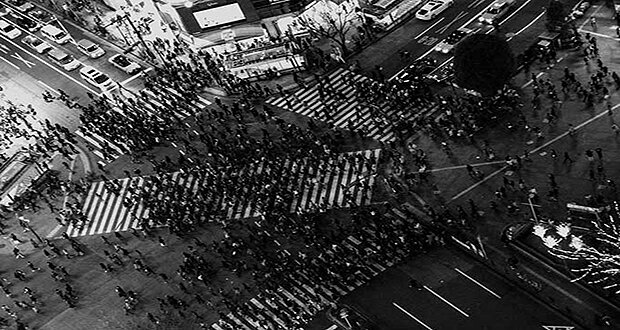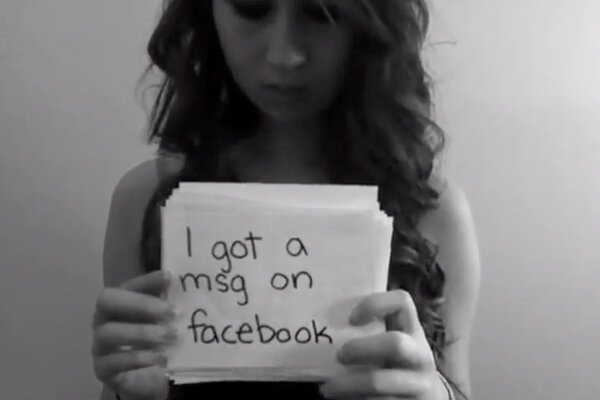As a sociologist I've always been interested in surveillance. Jeremy Bentham, Foucault, Orwell. Like it or not surveillance is an aspect of the industrial and post-industrial world. It's been talked about for centuries and dystopian authors like Orwell, sociologists like Foucault, and others have worried about the future directions and the implications of total surveillance and control. Well, almost 30 years after 1984 is the Ministry of Truth finally here and right under our noses? Don't be shy. Show us your face and tell us "what's on your mind" today.
In 1948 George Orwell wrote the novel 1984, a novel about a dystopian future society where total control of thought and action was the name of the game. A docile worker population, a subdued under class, and constant and uninterrupted war meant total submission to The System. The whole thing hinged on the quick identification of subversives, thought control, and the elimination of thought crime. According to George there were a number of ways thoughts could be controlled, from the ongoing revision of history and reality to the surveillance of the population. The goal was to use “psychology [and] surveillance to find and eliminate members of society who are capable of the mere thought of challenging ruling authority.” (ref)
The first step towards policing thought crime is, of course, knowing what people are thinking. Since most of us haven’t bothered to develop our telepathic abilities, if we want to know we have to ask. This is exactly what Facebook does when it asks you to reveal what you’re thinking about. The entry box seems so innocuous, and innocent. It is all about the “social” after all. Or at least, that’s what you think. You see, the trick in surveillance and observation, the secret of the Panopticon is, as Jeremy Bentham pointed out, to hide the surveillance(ref). And Facebook has done a brilliant job of hiding it right under your nose, and making you excited about participating in it as well. But you should be careful. If you have any doubts about the true nature of Facebook, or what it is really being used for, have a read of the article “Facebook’s Experiment and its CIA roots” (Martens & Martens, 2014). In this article the Martens’s point to a recent study published in the Proceedings of the U.S. National Academy of Sciences under the title: “Experimental Evidence of Massive-Scale Emotional Contagion Through Social Networks.” The implications of this study for mass emotional control should be clear, but if you have any doubts check out Segelken and Shackford (2014) who reveal that all you have to do to put people into a bad mood is make their news feed negative! It is not so hard, especially since, as Segelken (2014a) notes, people are drawn to revealing themselves and are indeed even coming to rely on on Facebook for their self-esteem needs (Kelley, 2013).
Thinking about this you have to be aware, that’s a lot of power. With billions of people being hooked to Facebook in the same way they are hooked to drugs and gambling, and with the officers of Facebook being above normal ethical controls, and possibly linked to military dollars (Editorial Board, 2014a, 2014b), we should be careful, or at least thoughtful, about the direction of our modern surveillance technologies.
So tell us, “what’s on your mind.”
Share with us your likes and dislikes.
Let us follow you around a bit.
If you listen to subsersive rock and roll, we’d like to know.
If you liked that critical social documentary you saw on Netflix, by all means tell us.
Come to us for your emotional need and remember, saccharine and non-threatening entertainment keeps you docile, and that’s good!
That’s what we like to see.
So don’t be afraid.
We’re only here to help and we can’t do that unless you tell us…
“What’s on your mind today?”
References
Editorial Board (2014a). Correction for Kramer et al., Experimental evidence of massive-scale emotional contagion through social networks. Proceedings of the National Academy of Sciences, 111(29), 10779-10779.
Editorial board (2014b). Editorial Expression of Concern: Experimental evidence of massivescale emotional contagion through social networks. Proceedings of the National Academy of Sciences, 111(29), 10779-10779.
Kelly, S. (2013). Facebook assures us we’re good enough, smart enough. Cornell Chronical(June).
Kramer, A. D. I., Guillory, J. E., & Hancock, J. T. (2014). Experimental evidence of massive-scale emotional contagion through social networks. Proceedings of the National Academy of Sciences, 111(24), 8788-8790.
Martens, P. (2014). Facebook’s Experiment and its CIA Roots. Wall Street on Parade. Retrieved from http://wallstreetonparade.com/2014/07/facebook%E2%80%99s-experiment-and-its-cia-roots/
Segelken, H. R. (2014). Facebook status: ‘Feel like disclosing innermost feelings’. Cornell Chronical(March).
Segelken, H. R., & Shackford, S. (2014). News feed: ‘Emotional contagion’ sweeps Facebook. Cornell Chronical(June).
Sociological Enlightenment

The Rocket Scientists' Guide to Money and the Economy: Accumulation and Debt
The world is in political, social, spiritual, and economic chaos and it doesn't seem to be getting any better. The global economy teeters on the brink of collapse while social violence and chaos explodes on ubiquitous screens. What's going on and, more importantly, what can we do about it?
The Rocket Scientists' Guide to Money and the Economy has the answers, and the solutions, you seek. In this book learn about money, accumulation, debt, the globalized economy of accumulation, and how The Family is taking us all down a path of total global destruction. Learn how it all started, how we've gotten ourselves to this point, and what we need to do to fix the problem before it is too late.
We can't afford to wait for the global elites to solve the problems they have caused because they don't know how. Read The Rocket Scientists' Guide to Money and the Economy Today and find out for yourself today.
[ Kindle | Amazon.com | Book Finder Download PDF ]
Full Entry
 The Socjourn A New Media Journal of Sociology and Society
The Socjourn A New Media Journal of Sociology and Society



The difference between 1984 and the social-networks is that now you can freely organize the fall of the government just by “twitting” what is in your head etc…
Well we’ll have to see about that. So far the only thing that Facebook and Twitter has accomplished on that front is to help replace a civilian dictatorship with a military one. Hmm. I guess we’ll have to wait and see just how progressive current events turn out in the long run.
facebook is much like a panopticon that bentham used. you are constantly surveiling your friends seeing what they are doing but at the same time they are watching you right back. using facebook you are then on both sides of the panopticon
No, that’s not it. It’s not users watching other users, it’s other organizations watching users. Take a look at the facebook user agreement. It specifies that by using facebook you allow your data to be transferred to the US and processed. That’s a pretty wide legal statement. It doesn’t specify who can process, or for what reason, or anything, it just says processing. Which means that Facebook can process your data in any way it sees fit, or hand it over to other organizations (CIA, FBI, Homeland) for processing as well. That’s where the panopticon arises. Prisoners can always observe prisoners close to them, but it is the authorities who have access to the entire data set and that is what makes Facebook a panopticon! The surveillance is not symmetric as you suggest, but asymmetric in a most profound and disturbing way. It’s a system agents dream, really. The public willingly reveals its private likes, dislikes, interests, and activities. Don’t even have to hire data entry people since you enter the data into the database on your own!
I must admit that i haven’t come across such an invitation to the defiance to anything this social networking and panopticum superstructural surveillance model might or might not mean. I believe that there is not a great need to monitor individuals these days, even if it would be so easy done by some program that may collect and collate and synthesize informations provided by a source/individual. We have come a long way these days and the system already established its ways to control and subdue or tame restless spirits. Only then when something becomes politically important then the red lamp flashes. In the end, who is ready for a sacrifice these days, who is ready to devote himself/herself to a higher cause, who believes in higher cause, The crisis of meaning, identity, pluralism and gamut of informational bombardment made us numb and weak. Who is able to become a victim for an ideal, who is modest enough. These things are now archetypes and nothing more, the just rebellion is not something that gathers many followers. On the other hand it may turn into aggression and devastation if it is lead by the people of “interest“ and not by “people of meaning“. I appreciate the call and I’ll participate in “sharing“, to quote Dr Sosteric.
It’s a laugh how E Mail (will not be published) but it’s (required). All information on the Internet post on any websites is stored and viewed by sophisticated electronic surveillance technologies. We are all a part of a “Sentient World Simulation”, not just a panopticon. Actions and outcomes are achieved using “feedback” through a variety of communications technologies. The Global Brain is an artificial intelligence acting in an anthropomorphic “godlike” role.
Interesting article. I have noticed, especially with college students, that people are willing to be vulnerable (even reserved) in the face of social networks. I am reading a book called Dataclysm by Christian Rudder and it is about how social network impacts and shapes human interaction. Very interesting read. I am fascinated how social networks are a platform for sociology.